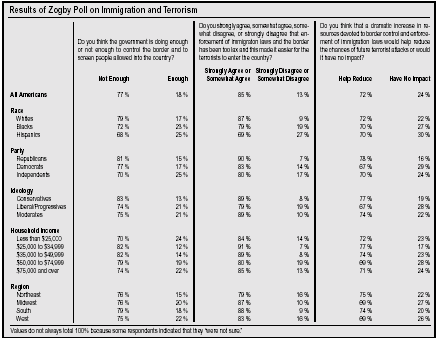WASHINGTON (September 27, 2001) - As the nation formulates its response to terrorism, a new poll finds that the American people feel strongly that significant changes in immigration policies are needed. The Zogby International poll being released by the Center for Immigration Studies today is the first poll since the attacks of September 11th that examines whether Americans think we are doing enough to control the nation's borders and screen those allowed into the country. The survey of likely voters shows that virtually all segments of American society overwhelmingly feel the country is not doing enough. By wide margins, the public also feels that this lack of control made it easier for the terrorists to enter the country. Moreover, Americans think that a dramatic increase in border control and greater efforts devoted to enforcing immigration laws would help reduce the chance of future attacks.
The full results (including exact wording of questions) are in the table below:

(Click on table for larger image.)
- When asked whether the government was doing enough to control the border and screen those allowed into the country, 76 percent said the government was not doing enough and only 19 percent said the government was doing enough. While self-identified conservatives were the most likely to think not enough was being done (83 percent), 74 percent of liberals and 75 percent of moderates also indicated that enforcement was insufficient. In addition, by a margin of more than two to one, blacks, whites, and Hispanics all thought government efforts at border control and vetting of immigrants were inadequate.
- Specifically with regard to the terrorist attacks, 85 percent of likely voters thought that lax enforcement of the border and of immigration laws made it easier for the terrorists to enter the country. An overwhelming majority in virtually all social groups feels that lax enforcement contributed to the attack.
- Wide margins across a broad range of society also feel that a great deal more needs to be done. When asked about future terrorist attacks, 72 percent of likely voters said that a dramatic increase in resources devoted to border control an enforcement of immigration laws would help reduce the chances of a terrorist attack in the future. Only 24 percent thought such efforts would have no impact.
"There are few issues on which Americans from a broad range of perspectives and backgrounds agree. A strong belief that enforcement of immigration laws and border controls has been too lax and that this contributed to the attacks of September 11 appears to be one of them," said Center Director of Research Steven Camarota. "These results don't necessarily mean the public has turned against immigrants or even against immigration, but they do mean that the vast majority of Americans seem to feel that we have lost control of our borders. And it's clear the public very much wants this to change."
Other findings:
- On of the most important results of the survey is the intensity of feeling of those who think that lax enforcement contributed to the attack. Of likely voters, more than two-thirds (68 percent) said they strongly agree that enforcement of immigration laws and the border has been too lax and that this made it easier for the terrorists to enter the country. Another 17 percent said they somewhat agree. In contrast, only 7 percent said they strongly disagree and 6 percent indicated they somewhat disagree that enforcement is too lax.
- Another important finding is that virtually all groups in society seem to think that not enough is being done to control the border and vet prospective immigrants. For example, even though a much larger share of Hispanics may wish to bring a family member into the country, 68 percent of Hispanics still felt the government was not doing enough to enforce immigration laws and control the border. Only 25 percent thought the government was doing enough. Moreover, 70 percent of Hispanics said a dramatic increase in enforcement efforts would reduce the chance of a terrorist attack in the future.
This nationwide poll of 1,018 likely voters was conducted by Zogby International from September 15 to September 16, 2001. All telephone calls were made from Zogby International headquarters in Utica, N.Y. The margin of error is +/-3.2 percent. Margins of error are higher in sub-groups.
Political Implications: These results indicate that policymakers who are pushing for greatly stepped up enforcement at the border and more scrutiny of those wishing to immigrate to the United States will likely find strong support among the American people. Although in the past few years a move toward an even more lax immigration policy seemed to be gaining political momentum, the results of this survey indicate that there is very strong public opposition to such efforts. Advocating a more controlled immigration system may become a very politically attractive option for many politicians not only because it is popular, but also because it would not involve any infringement on the civil rights of American citizens.
Policy Implications: The public certainly does not have a detailed understanding of immigration policy, but based on the results of this poll there are a number of changes, some of which are already under consideration, that Americans would almost certainly support: reviving Section 110 of the 1996 immigration law, which was shelved last year, requiring that all entries and exits from the United States be recorded; fully implementing the CIPRIS system that is designed to track foreign students and determine whether they are honoring the terms of their visas; increasing funding for Border Patrol agents; requiring extensive background checks of visa applicants; and improving the infrastructure for processing foreign citizens at the nation's borders and airports. The results of the Zogby poll indicate that proposals of this kind would be enthusiastically supported by the American people.
